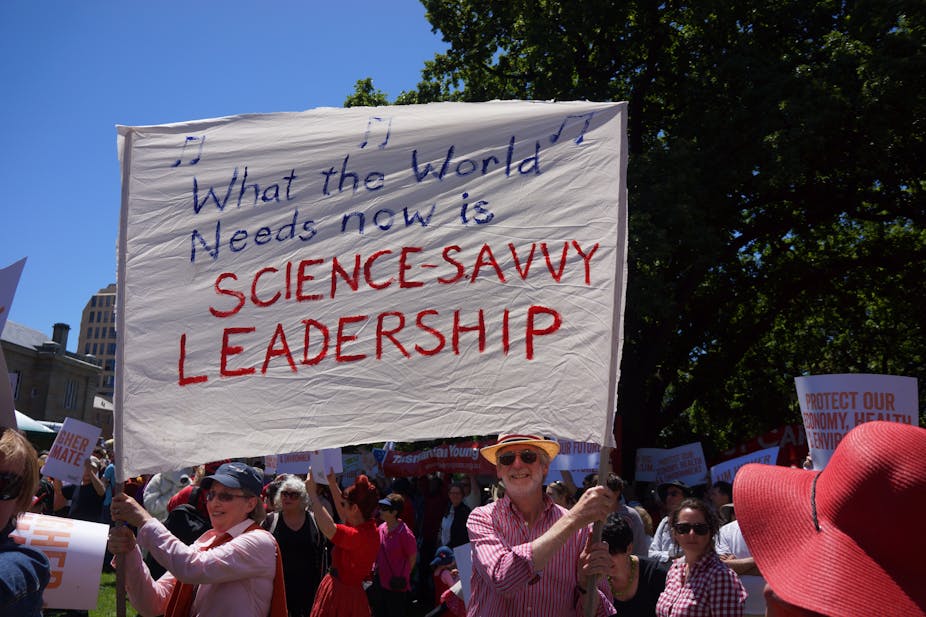A recent US “survey of surveys” by Stanford University Professor Jon Krosnick has analysed public opinion on climate change in 46 of USA’s 50 states. Krosnick found to his surprise that, regardless of geography, most Americans accept that global warming is happening and that humans are causing it.
In all 46 states, they found that at least 75% of participants thought global warming was happening. Even in traditionally conservative red states such as Texas, 84% thought global warming was happening and 72% agreed humans were the cause. Acceptance of global warming increased to at least 84% for states hit by drought or vulnerable to sea level rise.
In all states, at least 65% of Americans thought humans were causing global warming. Utah showed the lowest level at 65% while acceptance was highest in New Hampshire with 90%. Most Americans also supported government curbs of greenhouse gas emissions from power plants.
This is comparable to a CSIRO analysis that found 75% of Australians believe climate change is happening. While these results indicate high public acceptance of climate science, there is still a significant gap between public opinion and the views of climate scientists. A 2009 survey of the scientific community found that among actively publishing climate scientists, 97.4% agreed that human activity was changing global temperature.
This result has since been replicated by an analysis of public statements by climate scientists, finding 97% consensus among 908 scientists who had published peer-reviewed climate research. Earlier this year, I was part of a team that analysed 21 years of climate research. Among 4,014 papers that stated a position on human-caused global warming, we found 97.1% agreement that humans were causing global warming.
Of course, let me head off the flood of inevitable comments by pointing out that our understanding of climate change is based on empirical evidence. There are many lines of independent observations indicating that humans are causing global warming. The consilience of evidence has resulted in an overwhelming and strengthening consensus in the climate science community.
Three quarters of Americans may not be as high as the 97% scientific consensus. However, politically speaking, it is still a strong majority. So why is there so little support for climate action among politicians?
While the general public on average accepts climate science, Republicans are more likely to reject the scientific consensus. This is particularly the case with conservative Republicans, who are more likely to vote in primaries. During the 2012 Republican Presidential primaries, even candidates who accepted the science were forced to reject the scientific consensus in order to gain the support of their party.
Many studies have found a significant link between political ideology and climate beliefs. In 2006, Heath and Gifford found that support for unfettered free markets was a significant predictor of climate change concern. In other words, those who oppose government regulation of the fossil fuel industry are more likely to reject climate change science. The more politically conservative one is, the more likely they are to reject climate science.
However, there is a schism even within the Republican Party. A recent Pew survey found that among Tea Party members, only 25% accept global warming. In contrast, 61% of other Republicans accept that global warming is happening. A minority group out of kilter with the rest of the populace and the scientific community are exerting a disproportionate influence on the public discourse about climate change.
This is also occurring in Australia. A survey of Australian views on climate change found that only 7% of Australians think climate change isn’t happening. When the 7% of Australians who deny climate change are asked to estimate how many Australians share their views, they estimate 49%. This is known as the false consensus effect, a tendency to overestimate how popular one’s opinion is.
However, a more insidious and destructive effect is pluralistic ignorance. This is where people privately reject an opinion but incorrectly think others accept it. For example, when Australians are asked to estimate the percentage of Australians that deny climate change, the average answer is at least 20% - around three times the actual amount.
Similarly, there is a significant gap between public perception of scientific consensus and the 97% reality. A 2012 survey found that 57% of Americans either disagreed with or were unaware of the fact that most scientists agree global warming is happening. This matters because perceived consensus is a strong predictor of support for climate policy. When people think the scientists agree, they are more likely to support climate action.
Unfortunately, mainstream media outlets are perpetuating the misconceptions. One way they achieve this is by granting outlier voices disproportionate visibility in the public arena, creating misleading and counterproductive debates.
For example, ABC’s Q&A regularly features public figures who reject climate science (but are rarely climate scientists). While the back-and-forth generates much heat that arguably makes for entertaining television, such displays reinforce the myth of disagreement among the climate science community.
The public need to recognise that contrarian voices that deny the scientific consensus are a minority among the general public. More importantly, the public need to correctly perceive that scientists who reject the consensus are a vanishingly small minority in the climate science community, which shows an overwhelming and strengthening consensus.

